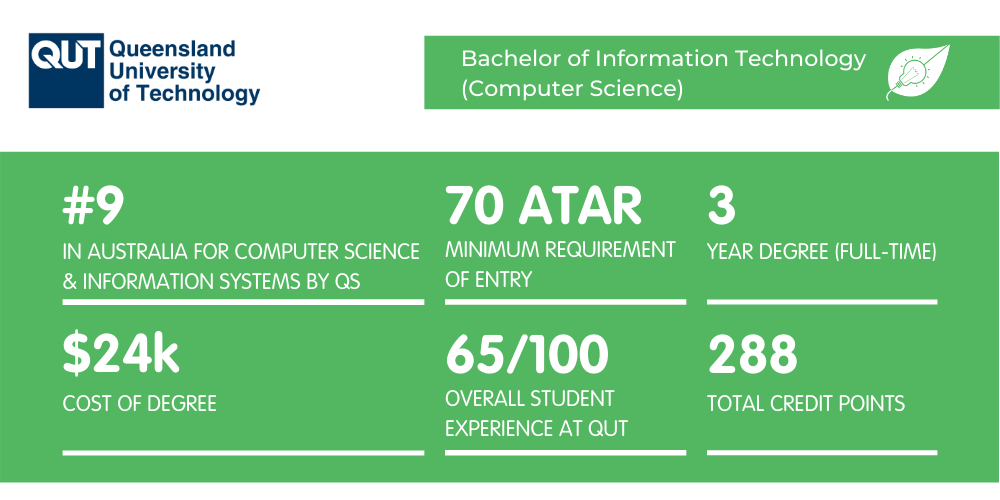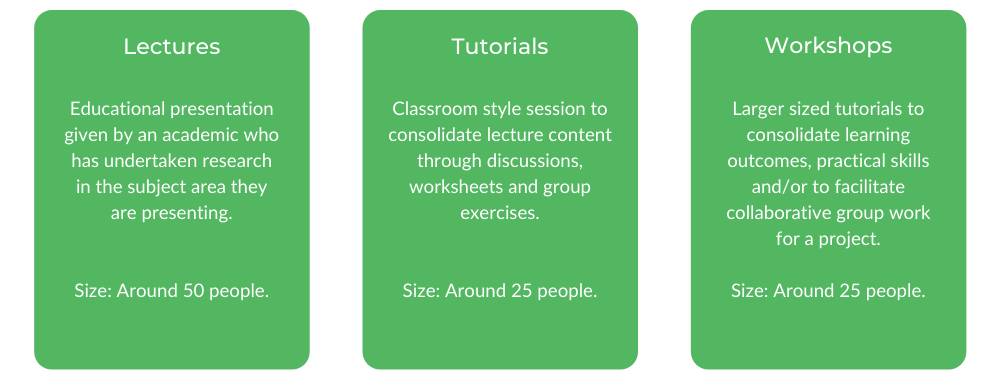So, you’re interested in studying a Bachelor of IT in Computer Science at QUT?
Well, keep on scrolling because you’ve come to the right place to find out everything there is to know about the degree including the core units, assessments, types of classes and career opportunities!
Let’s get going!
What is a Bachelor of Information Technology (Computer Science) at QUT?
Core Units for this Degree
How to Get into Computer Science at QUT
What’s the Teaching Format?
What’s the Faculty and Culture Like?
What is a Bachelor of Information Technology (Computer Science) at QUT?
A Bachelor of Information Technology in Computer Science at QUT provides you with the skills and knowledge you need to design and handle IT projects. You’ll learn about programming, coding, project management and how to work with clients.
There are hands-on and practical subjects where you’ll work collaboratively to develop solutions for IT projects. In your final year, you’ll complete a Capstone project where you work in teams to create a product, following it from the initial idea through all the stages up to testing it and delivering it to project stakeholders.
Can it be studied with another degree?
You can take your degree to the next level by combining it with another one!
Check out what you can combine your IT degree with:
- Business (4 years)
- Communication (Digital Media) (4 years)
- Creative Industries (4 years)
- Design (Interaction Design) (4 years)
- Mathematics (4 years)
- Science (4 years)
- Education (Secondary) (4.5 years)
- Engineering (Honours) (5 years)
- Law (Honours) (5.5 years)
Career Paths
A degree in Information Technology (Computer Science) opens up doors to a lot of different job opportunities!
Here are just a few examples:
- Computer scientist
- Programmer
- Systems analyst
- Information security specialist
- Product manager
- Software engineer
- Network architect
- User interface designer
…and the list goes on and on!
Core Units for this Degree
Degree Structure
There are four core units that all Information Technology students (both Computer Science and Information Systems majors) have to complete. You then get to select two IT core units from a provided list.
You’ll then complete ten subjects that relate to your Computer Science major and then you get the chance to choose what you want to do with the rest of your credit points. You can either choose a second major, two minors or one minor and four electives.
Core Information Technology units
All IT students complete these units and we’ll be breaking down each one of them!
Introduction to Computer Systems is all about how computer systems are built and function. By the end of this subject, you will have developed your own small computer system (pretty cool!).
The subject Building IT systems teaches you about coding don’t worry, if you’ve never had any experience before — that’s the point of this subject. For one of the assignments, you’ll use your newfound programming knowledge to create an interactive application.
IT Design systems is all about using your IT knowledge and skills to address different challenges in the industry and in Database Management, you’ll learn about data modelling.
Check out the list of extra core units here in which you can choose two from — it’s your choice which ones you take depending on what you’re most interested in!
Computer Science units
There’s ten Computer Science based units which cover everything to do with programming and coding. Now, don’t worry if you don’t totally understand or have any prior knowledge about programming and coding — you’re not expected to and you’ll cover all of this throughout your degree.
Software Development is all about working in a collaborative environment to develop a software solution and keep in mind, you’ll also have a final exam about all the theories discussed in this subject.
IT Project Management covers different strategies and techniques for you to be able to successfully lead and manage various IT projects in a collaborative environment.
In Networks, you’ll learn about different network-based applications and you’ll have to find solutions to interrupted networks. If you want to see what the rest of the Computer Science units are like, look here!
Second Majors
If you’re interested in choosing a second major for your complementary studies, you have two options:
- Computational and Simulation Science (combines science, maths and IT for modelling, simulation and visualisation)
- Data Science (think statistics, data and various management techniques)
Minors
As long as you meet the prerequisites, you can actually choose to minor in any subject across the university! Check out the list right here!
You could choose a minor from Society and Culture, Science, Languages or even Health (pretty cool!).
There’s also a list of Information Technology related-minors if you want to further develop your skills — Enterprise Systems, Mobile Applications, Information Systems, Networks and Security and more! Look under the Details and Units – Minors section to see all the different options!
Internships
You don’t have to do an internship for this degree but it’s always a good idea to get experience in the industry before you graduate!
However you do have a Capstone project in your final year where you work in a team to develop a product in a professional context! So, you definitely get some real-world experience!
Opportunities to Travel
There is the possibility to go on exchange for one or two semesters and study at one of the many QUT partner universities! You must have completed one whole year of study prior to going abroad and have scored at least a GPA of 2.5 (out of a 4-point scale).
How to Get into a Bachelor of Information Technology (Computer Science) at QUT
You’ll need an ATAR of 70 to get into this course! Keep in mind that there are some subject prerequisites too — you’ll need to have completed Units 3 & 4 of General Mathematics or Mathematical Methods or Specialist Mathematics.
Pathways
Now, if you didn’t meet the required ATAR for this degree — fear not because there is another way you can study a Bachelor in Information Technology (Computer Science).
You can complete a Diploma in Information Technology which then sets you up to enter the second year of Information Technology (as long as you successfully complete the course). You can either choose to complete the Diploma full-time (8 months) or part-time (12 months).
Depending on when you start or finish the Diploma, for a Bachelor of Information Technology, you can either start in February or July.
Scholarships
There are many scholarships for different faculties at QUT which can be found here! You should also check out the QUT College Merit Scholarship and QUT Excellence Scholarship (minimum ATAR of 98).
What’s the Teaching Format?
A Bachelor of Information Technology (Computer Science) at QUT combines lectures, tutorials and workshops. You’ll complete the degree through semesters.
Class Structure
Lectures
Lectures go for around 2 hours and usually have about 50 people in them (depending on the subject and whether everyone turns up).
In the lectures, you’ll learn all the content, so get ready to write lots of notes. The lecturers try to be engaging and get you involved!
Tutorials
In the tutorials, you’ll have about 25 people and they usually go for 1.5 hours. These classes are interactive and discussion based, where you’ll go over the content from the lectures and work through various tasks.
Workshops
Like the tutorials, the workshops are smaller in size with about 25 people. You’ll have workshops for the subjects where you use hardware such as arduinos and raspberry pi.
The workshops go for 1.5-2 hours in which you’ll complete a quiz or program depending on the content taught in the lectures and tutorials. It’s good to know that attending the workshops make up a small percentage of your grade — so make sure you go!
How many hours do you spend at uni?
You’ll take four subjects a semester if you decide to study a Bachelor of IT in Computer Science at QUT full-time. So, you can expect around 6 contact hours per subject which equals 24 contact hours a week (give or take).
Plus, you’ve got to remember you’ll need more time on top of that for study and assignments!
What are the assessments like?
You’ll have a fair few assessments where you submit the codes you develop to an AMS system (Automatic Marking System) which automatically checks them and tells you which ones are correct/not correct.
Most of the assessments are assignments, however you will have the odd exam for some subjects.
It really depends on the subject — for more programming focussed subjects, you’ll submit your codes to the AMS while for the subjects which are more about object oriented design, then you’ll have an exam (usually multiple choice questions).
You’ll also have real-life simulations where the tutor is the client and then you have to run meetings and interviews with them.
Skills That You Refine and Learn
You’ll develop your communication skills and in particular, throughout the course, you’ll be taught how to run scrum meetings (this is known as an agile development cycle where you’re upfront with the client about everything you do at each stage of the project).
You’re also taught how to best communicate with the client and how to develop the program according to what they want.
Of course, you’ll learn how to work well in a team because most of the time, you won’t be working alone — instead it will be in a group environment and that’s why there are a fair few group assignments throughout the degree.
Now, of course, problem-solving is a big part of Computer Science as you’ve got to find solutions in order to code and create different programs.
What’s the Faculty & Culture Like?
Faculty
Luckily for you, the lecturers and tutors are usually very friendly and helpful! They are really involved with your learning process and some set up external platforms so you can easily get in contact with them if you have any questions.
Culture
Josh, our interviewee, actually runs a lot of the Information Technology gatherings for the first and second year IT units where all the students meet up and help each other with different questions, the content and assessments.
Although there is a bit of competitiveness involved within the degree (especially when GPAs are released), it still is a friendly and supportive environment! There are even impromptu sessions where the tutors set aside time outside of their working hours to help you out if you have any questions.
You should definitely check out the CODE Network which is all about creating software and developing your career with hackathons, networking evenings, industry panels and various workshops.
There’s also Women in Technology which is all about supporting women in the technology world and establishing a network! They have industry panels, study sessions, end of sem Netflix parties and trivia nights!
Tanna Nankivell is a Senior Content Writer at Art of Smart Education and is currently in Germany completing a year of study for her double degree in Communications (Journalism) and Bachelor of Arts (International Studies). She has had articles published on Central News – the UTS Journalism Lab and wrote a feature piece for Time Out Sydney during her internship. Tanna has a love for travel and the great outdoors, you’ll either find her on the snowfields or in the ocean, teaching aqua aerobics or creating short films.






